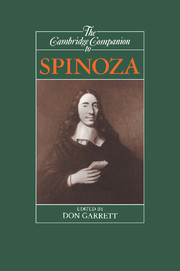Book contents
- Frontmatter
- Introduction
- 1 Spinoza's life and works
- 2 Spinoza's metaphysics
- 3 Spinoza's theory of knowledge
- 4 Spinoza's natural science and methodology
- 5 Spinoza's metaphysical psychology
- 6 Spinoza's ethical theory
- 7 Kissinger, Spinoza, and Genghis Khan
- 8 Spinoza's theology
- 9 Spinoza and Bible scholarship
- 10 Spinoza's reception and influence
- Bibliography
- Index
1 - Spinoza's life and works
Published online by Cambridge University Press: 28 May 2006
- Frontmatter
- Introduction
- 1 Spinoza's life and works
- 2 Spinoza's metaphysics
- 3 Spinoza's theory of knowledge
- 4 Spinoza's natural science and methodology
- 5 Spinoza's metaphysical psychology
- 6 Spinoza's ethical theory
- 7 Kissinger, Spinoza, and Genghis Khan
- 8 Spinoza's theology
- 9 Spinoza and Bible scholarship
- 10 Spinoza's reception and influence
- Bibliography
- Index
Summary
Benedict (Baruch) Spinoza's life is usually summarized in a few lines, as follows. He was born in 1632 in Amsterdam as a son of Jewish Marrano immigrants from Portugal. After having been educated as a Jew, he was excommunicated in 1656. While earning his livelihood, first by commerce and later by grinding lenses, he learned Latin in the school of Franciscus van den Enden and conversed with a circle of Amsterdam Collegiants, who were dedicated to Cartesianism. He lived in Rijnsburg near Leiden (1660-3), in Voorburg near The Hague (1663-70), and in The Hague (1670 onward). He published in 1663 under his own name Descartes's “Principles of Philosophy” [Renati Des Cartes Principiorum Philosophiae, Pars I et II, More Geometrico demonstratae), and anonymously in 1670 the Theological-Political Treatise (Tractatus Theologico-Politicus). After his death (February 21, 1677) his Opera Posthuma - containing in Latin his main work the Ethics, Demonstrated in Geometrical Order (Ethica, Or dine Geometrico demonstrata), the Correspondence (Epistulae) , the unfinished Political Treatise (Tractatus Politicus , the unfinished Treatise on the Emendation of the Intellect (Tractatus de Intellectus Emendatione), and a Compendium of Hebrew Grammar (Compendium Grammatices Linguae Hebraeae) - was published by his friends. They also produced a Dutch translation of the Opera Posthuma (without the Hebrew Grammar), called De Nagelate Schriften, in the same year. An early forerunner of the Ethics, in Dutch and entitled Short Treatise on God, Man, and His Well-Being (Korte Verhandeling van God, de Mensch en des zelfs Welstand), was discovered and published in the nineteenth century. Spinoza was a seventeenth-century rationalist philosopher much decried on account of his atheism.
- Type
- Chapter
- Information
- The Cambridge Companion to Spinoza , pp. 13 - 60Publisher: Cambridge University PressPrint publication year: 1995
- 5
- Cited by



